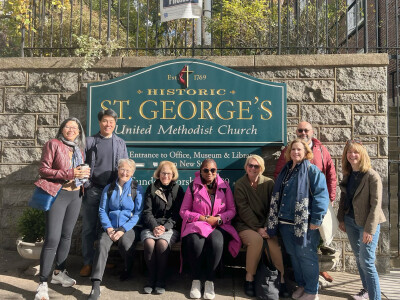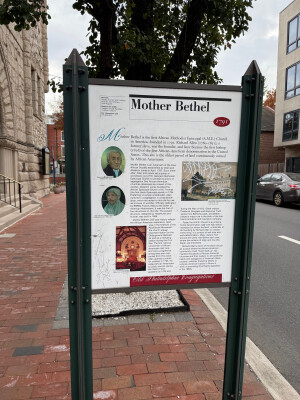Learning from Our Past to Shape Our Future: Northeastern Jurisdiction DCMs Gather in Philadelphia
 This week, the Directors of Connectional Ministry (DCMs) from across the Northeastern Jurisdiction gathered in Philadelphia to learn, reflect, and discern how our shared history can guide our ministries today. Our time together invited us to remember who we are as United Methodists, a people called to be in connection with God and one another, and to imagine how that sacred connection calls us to action in the world.
This week, the Directors of Connectional Ministry (DCMs) from across the Northeastern Jurisdiction gathered in Philadelphia to learn, reflect, and discern how our shared history can guide our ministries today. Our time together invited us to remember who we are as United Methodists, a people called to be in connection with God and one another, and to imagine how that sacred connection calls us to action in the world.
Our learning began with Dr. Ashley Boggan, General Secretary of the General Commission on Archives and History. Dr. Boggan led us through a powerful exploration of John Wesley’s understanding of connectionalism, not as a structure or system, but as a lived expression of relationship. For Wesley, to be “in connection” was to be in relationship: with God, with one another, and with the communities we serve. Dr. Boggan reminded us that our connection is not merely organizational; it is spiritual, rooted in grace and lived out through shared mission.
We then quite literally walked through history. Together, we journeyed from Historic St. George’s United Methodist Church to Mother Bethel AME Church, retracing the steps of Richard Allen and the early Methodist movement’s struggle for inclusion, justice, and dignity. The pilgrimage invited us to reflect deeply on the complexities of our history, the faith and courage that gave birth to new expressions of Methodism, and the call to reconciliation and equity that continues to challenge us today.
 At Mother Bethel, we were blessed to meet with Rev. Carolyn Cavaness, the church’s first female pastor. Rev. Cavaness shared with us the ongoing story of Mother Bethel’s ministry and the ways in which the AME Church continues to lead in faith-rooted justice and community engagement. Our conversation invited us to consider what it means to be partners in ministry today, honoring the past while seeking new paths toward healing and collaboration.
At Mother Bethel, we were blessed to meet with Rev. Carolyn Cavaness, the church’s first female pastor. Rev. Cavaness shared with us the ongoing story of Mother Bethel’s ministry and the ways in which the AME Church continues to lead in faith-rooted justice and community engagement. Our conversation invited us to consider what it means to be partners in ministry today, honoring the past while seeking new paths toward healing and collaboration.
Throughout the week, the DCMs also spent time discerning how we might work more collaboratively as a jurisdiction to respond to some of the most pressing needs of our world. Together, we reflected on opportunities for shared ministry in creation care, immigration response, and food advocacy. In these conversations, we sought to embody the very connection Wesley envisioned, a living network of relationships grounded in love and mission.
Our time in Philadelphia reminded us that connectionalism is more than a defining characteristic of United Methodism; it is a spiritual practice. To be in connection means to remember our story, to walk together in grace, and to join hands in God’s ongoing work of transformation.
As we return to our annual conferences, we carry with us renewed gratitude for our shared history, and a renewed commitment to live as a people in connection, for the sake of the world God loves.
